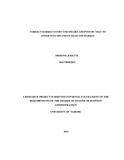| dc.description.abstract | The increasing globalization of business, the changing face of global political landscape, increased diffusion of political boundaries and the changing forms of governance structures for international firms motivated by innovations in the information technology necessities the need to focus on how international business firms undertake their business activities abroad. Foreign market entry has been accelerating over the years and has since attracted researchers worldwide seeking to find out the strategies used by firms. The literature on internationalization has revealed a number of barriers business face in their attempt to enter foreign markets. They have no choice but to evaluate and choose strategies that will enable them penetrate and gain competitive advantage. The study therefore sought to identify foreign market entry strategies adopted by Tigo to enter in Rwandan telecom market. The purpose of the study was to establish the foreign market entry strategies adopted by TIGO to enter in the Rwandan telecom market, establishing the strategies used by TIGO to enhance its competitiveness in Rwandan telecom market and to determine the challenges faced by TIGO in implementing these strategies.
The methodology employed in this study was a case study. The tool mainly used was interview and secondary data. The major findings from the data collected were that Tigo used foreign direct investment to enter Rwandan telecom market by opening its own branches in all districts of Rwanda, targeting new market, penetrating the existing market and developing new channels of distribution. However, Tigo Rwanda Ltd faces a number of negative challenges like Fiscal policy, economic elements such as exchange rate, inflation and income level. The efficiency of infrastructure is also another negative vi
challenge that Tigo Rwanda ltd had to deal with, the fact that approximately 92% of the population lives in rural area, the issue of rule and regulation such as labor regulation of the host country, and the problem of unskilled labor were also others challenges impacted Tigo Rwanda Ltd in implementing theirs strategies. Finally the study reveals a numbers of competitive strategies employed by Tigo Rwanda Ltd for enhancing its competitiveness. Those competitive strategies include differentiation strategy, Cost Leadership strategy, and diversification strategy and focus strategies. | en |

